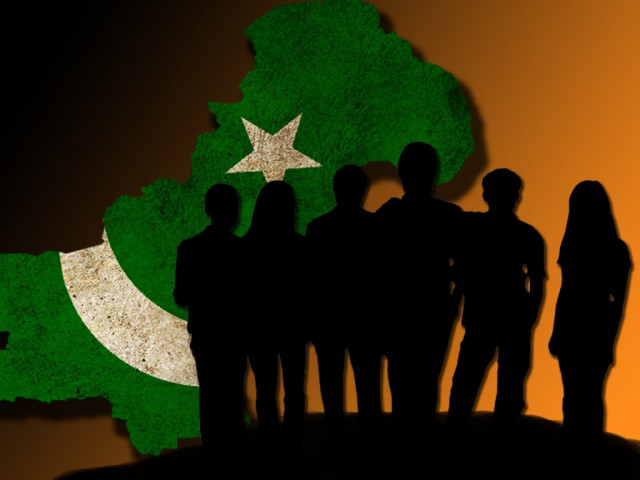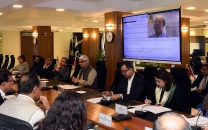National summit: Youth activists vow to bring about change in peace narrative
Participants raise questions on basic rights and governance issues.

Youth activists vow to bring about change in peace narrative. DESIGN: SUNARA NIZAMI/FILE
People’s mistrust of politicians and their frustration over bad governance was reflected in the interaction between participants of a national peace summit and politicians on Saturday.
However, the Youth activists’ subsequent messages, full of hope and determination, to change the country’s conflict-ridden reality, offered a glimmer of hope.
The peace summit was organised by Search for Common Ground (SCFG) Pakistan in partnership with the Sustainable Development Policy Institute (SDPI), at the Aiwan-e-Quaid auditorium in F-9 Park. The summit was held in connection with SCFG’s Pakistan Peace Initiative.

In the audience were around 100 peace leaders including youth activists, community leaders and journalists, who are the beneficiaries of a two-year SCFG project, “Promoting Dialogue for Peace-building through Media and Youth Mobilisation in Pakistan.”
Over 200 beneficiaries were trained in conflict resolution and peace-building between September 2011 and August 2013 by SCFG in collaboration with local partners, including the Pakistan Broadcasting Corporation SDPI and Pakistan Press Foundation. The project was supported by the Danish International Development Agency.
But as the summit’s second session entered the questions-and-answers phase, participants unleashed a volley of critical, often inarticulate, queries at five politicians on the panel. The questions touched upon basic rights and governance issues: healthcare, disparities in the education system, unemployment, corruption and youth policies, all issues obliquely connected with peace and development.
The politicians defended their party positions, which led to more scathing questions. After the organisers calmed down the house, Ammara Durrani, Executive Director of SFCG Pakistan, said, “There is still bitterness in our attitudes, there is still impatience. “We need to change our attitudes and develop tolerance to listen to others’ point-of-view.”

SDPI Executive Director Abid Suleri, however, saw critical questions as an encouraging sign. “When you allow issues that have been forcibly buried for years to surface, you get this kind of response.” He said the desire to hold representatives accountable is essentially a desire to see a stable, prosperous country.
The Guest of Honour, Danish Ambassador Jesper Sorensen said dialogue can help build empathy and tolerance in society as a means to achieve peace. “Peace thrives where there is co-existence, social justice, hope and creativity,” Sorensen said. “If we do not understand each other’s differences through dialogue, peace will be difficult to achieve.”
He said Denmark supports peace initiatives and continued joint efforts are needed to ensure that Pakistani communities recover and reconcile from the effects of violent conflicts.
Beneficiaries of the project, which was carried out in 25 districts of Pakistan, Gilgit-Baltistan, Azad Jammu and Kashmir and the tribal areas, said they had learned specific ways to tackle and defuse conflict situations from the trainings.
They said they will try to sustain the network of peace-building, which they formed during the trainings, through social media and on-ground community work.
Durrani said the objective of the peace initiative and the summit was to foster a “strategic shift towards peace, resilience and reconciliation.”
Chief guest Information Secretary Dr Nazir Saeed said Pakistan’s economic progress depends upon peace and stability. The media and the youth have a critical role to play in peace-building.
The day-long conference also featured a poster-making competition, visual performances, a mini-documentary screening and the release of peace lanterns.
Published in The Express Tribune, November 24th, 2013.



















COMMENTS
Comments are moderated and generally will be posted if they are on-topic and not abusive.
For more information, please see our Comments FAQ